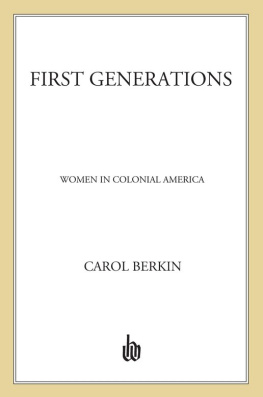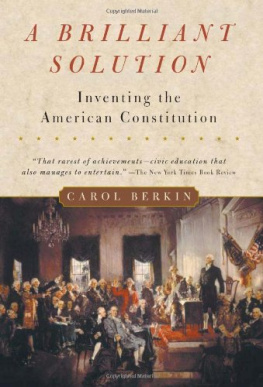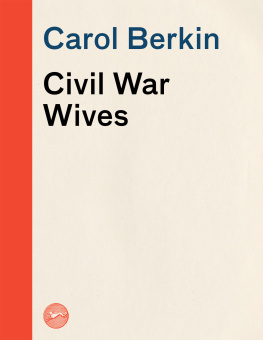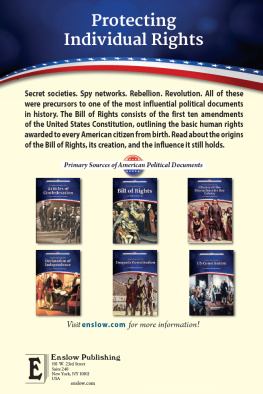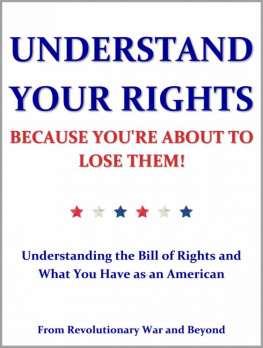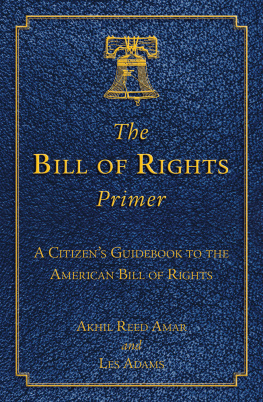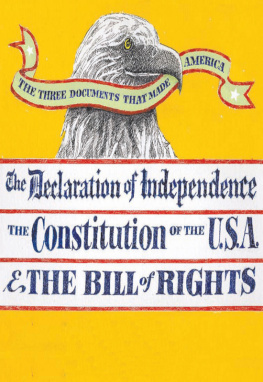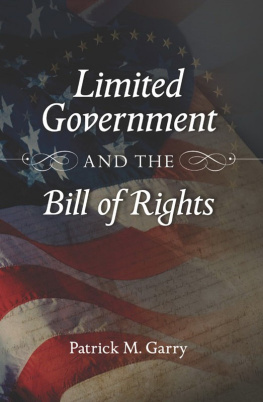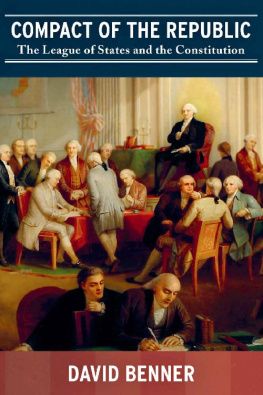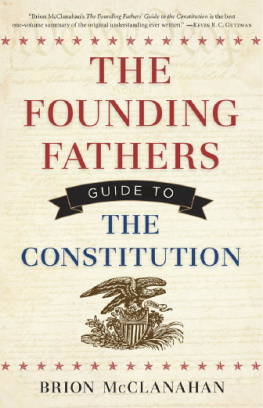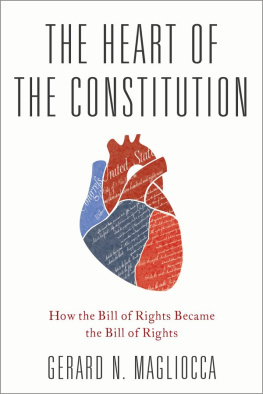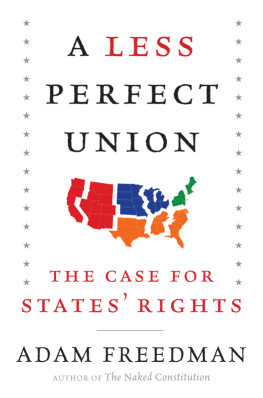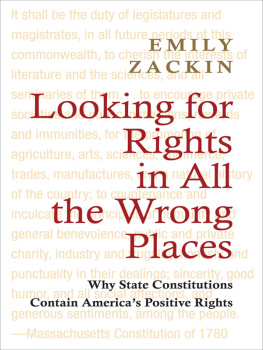Also by Carol Berkin
A Brilliant Solution: Inventing the American Constitution
First Generations: Women in Colonial America
Civil War Wives: The Lives and Times of Angelina Grimke Weld, Varina Howell Davis & Julia Dent Grant
Revolutionary Mothers: Women in the Struggle for Americas Independence
Wondrous Beauty: The Life and Adventures of Elizabeth Patterson Bonaparte

Simon & Schuster
1230 Avenue of the Americas
New York, NY 10020
www.SimonandSchuster.com
Copyright 2015 by Carol Berkin
All rights reserved, including the right to reproduce this book or portions thereof in any form whatsoever. For information address Simon & Schuster Subsidiary Rights Department, 1230 Avenue of the Americas, New York, NY 10020.
First Simon & Schuster hardcover edition May 2015
SIMON & SCHUSTER and colophon are registered trademarks of Simon & Schuster, Inc.
For information about special discounts for bulk purchases, please contact Simon & Schuster Special Sales at 1-866-506-1949 or .
The Simon & Schuster Speakers Bureau can bring authors to your live event. For more information or to book an event contact the Simon & Schuster Speakers Bureau at 1-866-248-3049 or visit our website at www.simonspeakers.com.
Interior design by Robert E. Ettlin
Jacket design by Archie Ferguson
Jacket art Desifoto/Digital Vision Vectors/Getty Images
Library of Congress Cataloging-in-Publication Data
Berkin, Carol.
The Bill of Rights : the fight to secure Americas liberties / Carol Berkin.
pages cm
1. United States. Constitution. 1st10th Amendments. 2. Civil rightsUnited StatesHistory. 3. Constitutional historyUnited States. 4. Madison, James, 17511836. I. Title.
KF4749.B45 2015
342.7303'9dc23
2014012843
ISBN 978-1-4767-4379-0
ISBN 978-1-4767-4381-3 (ebook)
To my granddaughter, Talulla Thomas Joyce
Contents
Prologue
For the majority of modern Americans, the Bill of Rights stands as the most important element of the Constitution, the touchstone, as James Madison hoped it would become, of our shared unalienable rights and liberties. Along with the Declaration of Independence, these first ten amendmentswith their guarantees of freedom of speech, religion, and the press, and the right to assemble; their promise of a speedy trial by jury; their protection against double jeopardy and unreasonable search and seizure; and their recognition of the right to bear armsannounce to the world our national values and ideals. They have served as the standards by which we measure our individual actions and the actions of our government toward its own citizens.
Yet hallowed by time as the Declaration and the Bill of Rights have become, it is crucial to place these two documents in their historical context and examine the immediate circumstances that generated them. The men who created the Declaration did so to justify a revolution, and the men who passed the Bill of Rights acted to secure the loyalty of citizens wary of their new federal government.
The men who debated, revised, and campaigned for and against the first ten amendments were eighteenth-century Americans. Their world is not ours. The memories they carried were of imperial abuses, the painful renunciation of their English identities, and a long and exhausting war for independence. The excitement they felt and the fears that haunted them were the result of a rare opportunity to create a new nation and to establish it as a republic. If they knew they were making history, they did not know what that history would be.
The men who produced the Bill of Rights were neither demigods nor visionaries. They were mere mortals, some brilliant, some quite ordinary, most of them wealthier and better educated than their neighbors. Almost all of them were veteran politicians, and though most of the issues they grappled with will seem foreign to us today, the tempo and tone of their politics will be familiar. In their wrangling and debating, in their manipulation of procedure to expedite their agenda or derail that of their opponents, in the flare-ups of ego and the indulgence of idiosyncracy, and in the combustible mixture of self-interest, ideals, and principles that propelled them, these men resemble political leaders of every era. But in their burden of serving in a government without precedents and with uncertain legitimacy, in their pressing anxiety that this government might fail, and in their knowledge that America was dwarfed by the great imperial powers across the Atlantic, they are uniquely men of the late eighteenth century.
In 1789, when James Madison proposed the Bill of Rights, the young nation faced a great ideological divide with regard to a question that is being revived today: should broad power and authority reside in the federal government, as the Federalists wished, or should it reside in the state governments, where the Antifederalists insisted it could best protect the peoples liberties? In these early years of the new nation, this ideological struggle was raw and fraught with immediacy, for the Constitution that empowered the national government was new and lacked the traditions that over time lend legitimacy and elicit loyalty. The political decisions the men of this early era made forestalled but did not dissolve the tension between localism and nationalism that was endemic to the federal system they created. That tension would reemerge in the nineteenth century when challenges to federal law and policy led to the Civil War. Even in our lifetime, this issue of where ultimate power should reside remains a Gordian knot.
This confrontation between states rights and national authority started with the fierce debates over ratification of the Constitution, and it continued in the First Federal Congress, in the state legislatures, and in the press as Washingtons first administration began. We can appreciate the Bill of Rights only in the context of this struggle. These amendments, conceived by James Madison, one of the most astute Federalists of his day, were intended to weaken, if not crush, the continuing opposition to the new federal government he had been so instrumental in creating. By assuring citizens that the new government would honor and protect their liberties, he hoped to achieve two interlocking goals. The first was to ease the fear of tyranny harbored by many within the general populace and thus separate the Antifederalist followers from their leaders. The second was to preempt the Antifederalists plans to pass amendments that would severely restrict the powers of the new government.
Madisons Bill of Rights was thus more a political strategy than a statement of Americas most cherished values. Yet Madison was keenly aware of its potential to set a high standard for the relationship between citizens and the men who governed them. Even more important to Madison, this explicit guarantee of rights and liberties could play a critical role in protecting minority groups from abuse by the majority. The addition of these amendments was thus a patriotic as well as a political measure, for it was designed to strengthen republican values and to ensure that the American government would honor the peoples right to life, liberty, and the pursuit of happiness. It was the genius of James Madison that he could unite practical considerations and noble aspirations, and join the ideological with the ideal.
All of the rights Madison wished to protect had their roots in the founding generations colonial and revolutionary past. They speak to imperial abuses and to hallowed Anglo-American traditions that do not resonate today. Yet the generations that followed added their understandings of these rights just as today we add our own. In this way, the amendments once dismissed as only a parchment barrier remains our collective heritage and we remain its guardian for future generations.
Next page

